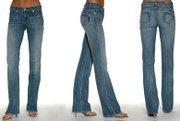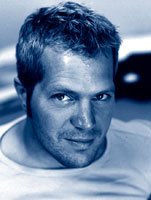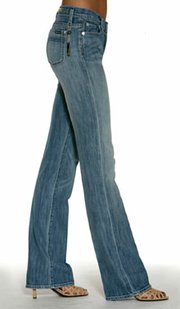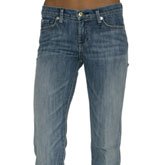International Denim Brands Finding New Home in L.A.
Two years ago, Canadian denim designer Jason Trotzuk was having a hard time getting manufacturers in Los Angeles to answer his calls, much less agree to produce Fidelity, his fledgling premium-denim brand. “I was so small, no one wanted to pay attention to me,” he said. Orion Anthony, the owner/designer of Small Town Jeans, another Canadian premium brand producing in Los Angeles, echoes that sentiment. “It was very difficult at first to find a contractor. I got lousy service and got tossed around because I was too small,” Anthony said.
Today, they say, it is a very different story.
The turnaround is due in part to the weakening American dollar and in part to the vacuum left behind as many of the pioneers of Los Angeles’ premium-denim culture move production offshore to cut costs. That leaves Los Angeles’ world-class denim contractors and laundries open to international brands looking for high-quality production, technical know-how and the cachet of a “Made in USA” label.
Money talks
“Compared to the euro, the Canadian dollar and the Japanese yen, the American dollar is cheap—of course [international denim] brands want to produce in Los Angeles,” said Sergio Blake, co-owner of the MOD Group, a Vernon, Calif.–based denim manufacturer who counts several international brands, including Small Town, Fidelity and Cursed Blue, another Canadian brand, among his clients. “Even though having denim made in the U.S.A. is much more expensive than producing in Mexico or China, it is still less expensive to produce here than in Europe—even if you’re shipping to places like Japan.” Added materials costs have also helped drive many larger brands offshore. American premium-denim makers who rely heavily on fabric imported from Italy and Japan have seen their fabric costs rise some 20 percent, for example.
“The softening American dollar has made it easy for me to make jeans in the U.S.,” Trotzuk said. “It only costs me about $4 more per garment to produce here than in China, and I get a level of skill and expertise that I could never get overseas.”
European brands have yet to move to Los Angeles in a big way, but Blake said some, including Italian denim brand Miss Sixty, are seriously exploring the city’s denim contractors and laundries. “It is only a matter of time before more [European brands] come to Los Angeles. In the same way Los Angeles denim companies are producing in Mexico and China for economic reasons, they will come to Los Angeles,” he said.
Jack Kyser, chief economist of the Los Angeles County Economic Development Corp., said the LAEDC hasn’t kept track of the influx of international brands to the city’s denim contractors or local brands’ migration overseas. Still, he said, “Los Angeles has a culture of denim, and many of those brands that helped launch it have gone, which, combined with the current American economy, makes it very attractive for international brands. The denim industry’s infrastructure is such that it can be taken advantage of [by these brands] very easily.”
Economics aside, the Los Angeles denim industry has become roomier as brands such as Paige Premium Denim, Antik, Joe’s Jeans, Seven For All Mankind and True Religion have moved their production to Mexico.
“Now, denim contractors and laundries have the time and capacity to work with and help cultivate small brands—international or not,” Trotzuk said. “The big guys have left the industry scrambling. All the skill and infrastructure is here, and they are still creating, still innovating. It is a wonderful time for me.”
Andrews agrees. “They are certainly hungrier now,” he said.
The city also offers the perfect backdrop for denim designers to keep up on trends and conduct business. “I can walk to Fred Segal or any number of stores and see what is selling,” Trotzuk continued. “I can drive to East L.A. and check up on the development of a pair of jeans or a new wash. Then I can hop on a plane and be home in time to watch TV before bed. The market here is so quick that I can design something and produce it immediately. That is definitely worth the extra $4.”
Marketing ’Made in the USA’
Premium denim has always been about style and status—hence the obsessive attention to fit and ubiquitous and highly protected copyrighted back-pocket designs. According to Trotzuk, a “Made in the USA” label— and the quality it implies—is as important as the logo on the back pocket. “If you are paying $1,200 for high-end boots or a handbag, you expect it to be made in Italy. ’Made in the USA’ is the best thing I can put on my labels. If someone is going to spend $160 to $200 on jeans, they expect them to be made in the United States. It is so important,” he said.
The premium brands that are moving overseas to produce volume are missing the point, he argued. “That label is going to be more and more important going forward. China is becoming more affluent. In Hong Kong, consumers don’t want anything that is made in China. Their high-end market is very strong, and they want products made in Italy, France and the U.S. Love it or hate it, people want to be part of the American experience.”
MOD’s Blake sees the market as being much more fluid and forgiving.
“Los Angeles is the first door denim brands have to knock on,” he said. “New brands don’t have the volume needs to go overseas, and they have to make a name for themselves with quality. From there, once they’ve established their quality and grown their distribution, they can knock on other doors. They can go overseas because they need the volume, and quality isn’t as important when you are that big.” MOD itself is following that pattern. It employs 150 to 200 people in its Los Angeles factory and more than 200 in its newer Mexican factory.
New brands, he said, will always come in to fill Los Angeles’ factories—whether they are domestic or international. “There will always be a need for what we do here,” Blake said. “They will come.”


























